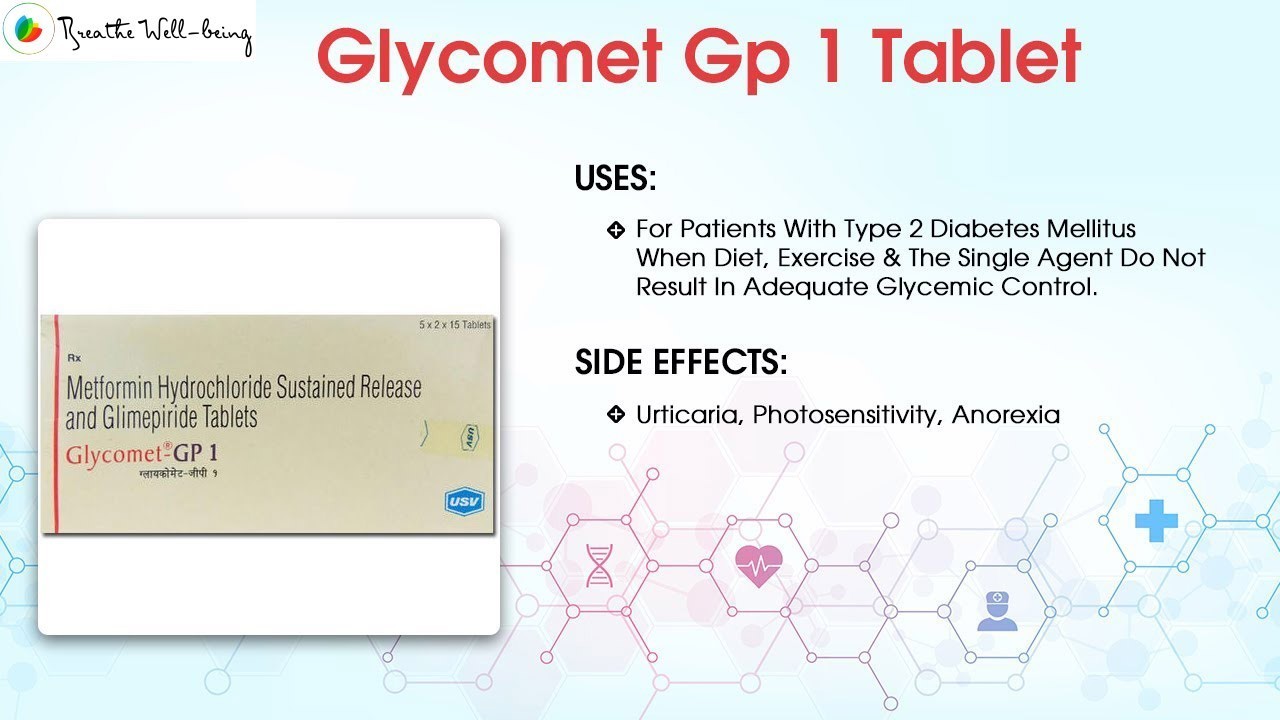Last updated on July 28th, 2023
If containing Metformin as an active ingredient, a Gluformin tablet is a very effective oral antidiabetic medication that belongs to the class of ‘Biguanide’. It is highly effective in lowering the heightened blood sugar levels when diet and physical activities are not able to control them.
Gluformin decreases glucose absorption in the intestine and reduces the production of glucose from the liver, which results in better utilization of sugar by the blood cells. You must consume this medicine as prescribed by the health practitioner and after meals. Make sure it is kept out of the reach of children, and children below 10 years of age are not advised to consume this drug. Stopping this medicine in an abrupt way can lead to complications.
While taking Gluformin, you might suffer a few side effects, including nausea, vomiting, diarrhea, metallic taste, or taste disturbance. Most of the side effects go away on their own, but in case they worsen, immediate medical help is needed.
Summary
Gluformin is a very effective antidiabetic medication belonging to a class of ‘Biguanide’, which helps in lowering the increased blood sugar levels when a healthy diet and physical activities are not enough.

Gluformin Contraindications
- Do not consume this drug if you have a history of being allergic to Metformin or any of the ingredients available in the Gluformin Tablet.
- Make sure you do not take this drug if you already have any kind of kidney or liver-related issues.
- If you have conditions such as dehydration, infection, or dizziness, then you must ignore having Gluformin.
- It is advised not to have this drug if you suffer from acid-base imbalance or diabetes complications such as diabetic ketoacidosis.
- If a patient is having other conditions such as heart issues, lung failure, liver disease, or heart attack, he/she must refrain from using Gluformin.
- Your doctor will also ask you not to take this medicine if you have dizziness or unconsciousness due to high or low blood sugar levels.
Summary
You should avoid taking this medication if you have a history of being allergic to the medication or any of its ingredients. You should also avoid it if you already have any kidney or liver-related diseases. You should also speak with your doctor if you experience anything unusual after taking this medication.


Possible Side Effects of Gluformin

There are many side effects a person can have after consuming Gluformin. In many cases, the side effects disappear on their own but in rare cases, you may have to take medical help. According to Apollo Pharmacy, the possible side effects are mentioned below:
- Nausea
- Diarrhea
- Vomiting
- Dizziness
- Abdominal pain
- Stomach ache
- Loss of appetite
- Taste disturbance
Summary
Diabetes patients consuming this medication may develop some mild side effects like nausea, diarrhea, vomiting, dizziness, abdominal pain, stomach ache, etc. These complications go away on their own, but in some cases, the side effects may persist for a longer period of time. In this situation, you are advised to seek medical help.
Precautions and Warnings Related to Gluformin
Pregnancy
Gluformin is not advised to be consumed during pregnancy as it can potentially affect the unborn baby. It is advised to inform your doctor and take this drug only after the advice of your doctor. If you have been put on this drug, make sure to inform your medical practitioner if there are plans of getting pregnant. The doctor may consider changing your medication by suggesting an alternative. However, according to a report published by the Medical News Today website, there is no evidence that Metformin or Gluformin increases the chances of pregnancy complications or loss.
Breastfeeding
Gluformin can pass into the breast milk of the lactating mother. It happens in very small quantities, which might not affect the health of the baby. But still, it is advised to consume this drug only after taking your doctor’s suggestion. Moreover, according to research published by the National Institute of Health, Gluformin is found and detected in breastmilk serum. Therefore, this medication is recommended to be used with caution while nursing premature or nursing babies.
Driving
This drug has no effect on the consumer’s ability to drive. In case you feel dizziness or a decrease in blood sugar levels after taking this drug, you should avoid driving. In this condition, you can also consult your doctor to seek medical attention.
Alcohol
Do not consume alcohol while you have been on this medication. It increases the risk of lactic acidosis. Hence, you are advised to seek medical help before consuming alcohol.
Summary
You are not advised to take this medication when pregnant without consulting with a healthcare practitioner. You can take it while breastfeeding, as it may not affect the health of the baby. The medication does not affect the patient’s ability to drive a vehicle. You are advised not to take alcohol while being on this medication.
General Warnings to Use Gluformin Tablet
Discuss with your doctor if:
- You have lactic acidosis
- You have altered kidney function
Talk to your doctor if:
- You experience symptoms of lactic acidosis like breathing difficulty, acute abdominal pain, muscle cramps and dehydration
- If You are experiencing an imbalance in your kidney function
- You are suffering from a heart disease, including heart failure
- You are planning to get surgery done
- If you are planning to get any contrast medium in the body
- Gluformin Tablets should not be given to any child below the age of 10 years
Summary
You are advised to consult your doctor if you experience breathing difficulty, abdominal pain, dehydration, muscle cramps, etc. You should also inform your doctor if you have heart disease. It is also not advised for children under the age of 10.
How Does Gluformin Tablet Work?
This medication decreases the amount of glucose absorbed from the intestine, lowering the sugar production in the liver and raising the absorption of sugar by the cells of the body from the blood.
Also read: Blood sugar unit converter
Directions to Use
This drug should be consumed as directed by your doctor. Consume it with one glass of water. It is advised to consume this drug at a fixed time for best results. Also, do not consume more than the prescribed limit.
Interactions of Gluformin Tablet
- Drugs like Verapamil, rifampicin, cimetidine, olaparib, etc., alter the effectiveness of Gluformin Tablet.
- Some drugs, such as Diuretics and thiazide, oral contraceptives, isoniazid, corticosteroids, phenytoin, nicotinic acid, calcium channel blockers, thyroid medicines, oestrogen tablets, ACE inhibitors, and angiotensin II receptor antagonists, raise blood sugar levels and damage kidneys. It is advised that people who have a history of kidney disorders must not consume this medication. Even research by the National Institute of Health says Gluformin can disturb renal and kidney functions.
- If you are kept on other medications, herbal preparations, or supplements, do not consume Gluformin to avoid interaction. You must discuss this with your medical practitioner.
Storage
- Store Gluformin below 25°C.
- Keep it in a cool and dry place.
- Protect it from sunlight and moisture.
- Keep out of reach of children and pets.
Read More: 15 Foods To Lower Blood Sugar Levels
Dosage of Gluformin Tablet
In case of Overdose
In rare cases, if the Gluformin drug overdoses, then the patient can feel symptoms like dizziness, drowsiness, breathlessness, vomiting, diarrhea, and irregular heartbeat. If you have more severe problems after taking too much medicine, then you must contact your doctor immediately and visit the nearest hospital.
In case of Missed Dose
It is suggested that you take the missed dose as soon as you remember. You can only skip the dose if it is time for your next scheduled dose. Do not take both doses at a time, or you can get some side effects.
Quick tips
Here are some quick tips for you to follow while being on Gluformin to keep your blood sugar levels under control:
- Doctors prescribe Gluformin tablets to diabetes patients to help them keep control over their blood sugar levels and reduce the risk of diabetes complications like heart diseases
- In comparison to other diabetes medications, Gluformin does not pose any threat of weight gain or low blood sugar
- You may suffer from hypoglycemia or low blood sugar if you are taking Gluformin along with other antidiabetic medications, alcohol or skipping a meal. You are advised to keep a sugar source nearby to get instant relief in such situations.
- Immediately inform your doctor if you experience any sort of rapid breathing, recurring or long-lasting nausea, vomiting, and persistent stomach pain after taking this medication. It happens because the medicine can potentially cause a rare but serious condition known as lactic acidosis.
- Taking this medication for a long period of time may cause vitamin B12 deficiency, which can appear with symptoms like anemia, fatigue, pale skin, breathlessness, or headache. You are advised to see a doctor immediately if you experience any of the above-mentioned symptoms. Your doctor may prescribe you some supplements to overcome this deficiency.
- When your doctor prescribes this medication, they may have to monitor your blood sugar levels and kidney functions to ensure you do not develop any complications.
Also read: Glycomet gp1 Uses
FAQs:
Is this drug safe to use?
Is Gluformin banned in India?
How to take Gluformin?
Can Gluformin make you sleepy?
What are the benefits of taking Gluformin?
Does Gluformin cause weight loss?
What does Gluformin Tablet do exactly?
Disclaimer
This site provides educational content; however, it is not a substitute for professional medical guidance. Readers should consult their healthcare professional for personalised guidance. We work hard to provide accurate and helpful information. Your well-being is important to us, and we value your feedback. To learn more, visit our editorial policy page for details on our content guidelines and the content creation process.

 English
English












